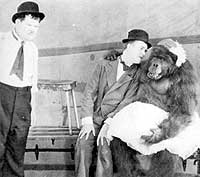What I need is… a small island
 When I was small I used to read Edgar Rice Burroughs. Characters in his Land That Time Forgot series experienced a form of evolution where they started at pre-stone age level, and would progress through several stages to become fully-formed, happy cavemen.
When I was small I used to read Edgar Rice Burroughs. Characters in his Land That Time Forgot series experienced a form of evolution where they started at pre-stone age level, and would progress through several stages to become fully-formed, happy cavemen.
Even then, I thought there was something wrong with this. How come they stopped at just being happy cavemen? Couldn’t they suddenly sprout wings and fly; maybe also sprout antennae and in an instant acquire all human knowledge?
Aah, mony a mickle maks a muckle, as a poacher once told me, and he was wrong because the acquisition of all possible physical and mental needs does not necessarily a happy bunny make.
It’s time to refer to that theory defined by Maslow, which assumes that contentment can be measured against a tick box of needs that would, if true, sort human beings into tiers ranging from Fred Flinstone to Smug Git.
I’m not going to try and piss off all those planners who may, from time-to-time, resort to slotting in that Maslow diagram into presentations. I’m not denying it can be useful, in the same way that statistics can help chivvy along an argument.
I’ve always considered that a weakness in the Maslow theory occurs when the lower tiers rise up and bite the arses of those in tier #1. Anyone fortunate enough to reach that lofty level of self-actualisation has supposedly fulfilled their needs, but is in danger of having to suddenly reprioritise those lower tier physiological needs when megalomania and paranoia set in and they lurch for the security section in Yellow Pages.
Actually, Maslow’s pyramid is a good theory, but like all such academic ideas, will be challenged by real-world pessimists wearied by a materialistic world (e.g. me).
And so it is with some surprise that I find a real-world example over which one could loosely overlay Maslow and say that the theory is broadly correct.
A new study identifies a small Pacific island as the happiest place on earth. Vanuatu comes top of this happiness index which is based on consumption levels, life expectancy and happiness, rather than national economic wealth measurements. With wealth taken out of the equation, it’s easy to see how materialistic countries such as the UK and USA fare so badly in the index (108 and 150 respectively).
Of course the irony is that this has absolutely no value to advertisers. What use are other people’s needs where wealth is not important to achieving happiness?
Tags: Surveys





No comments:
Post a Comment